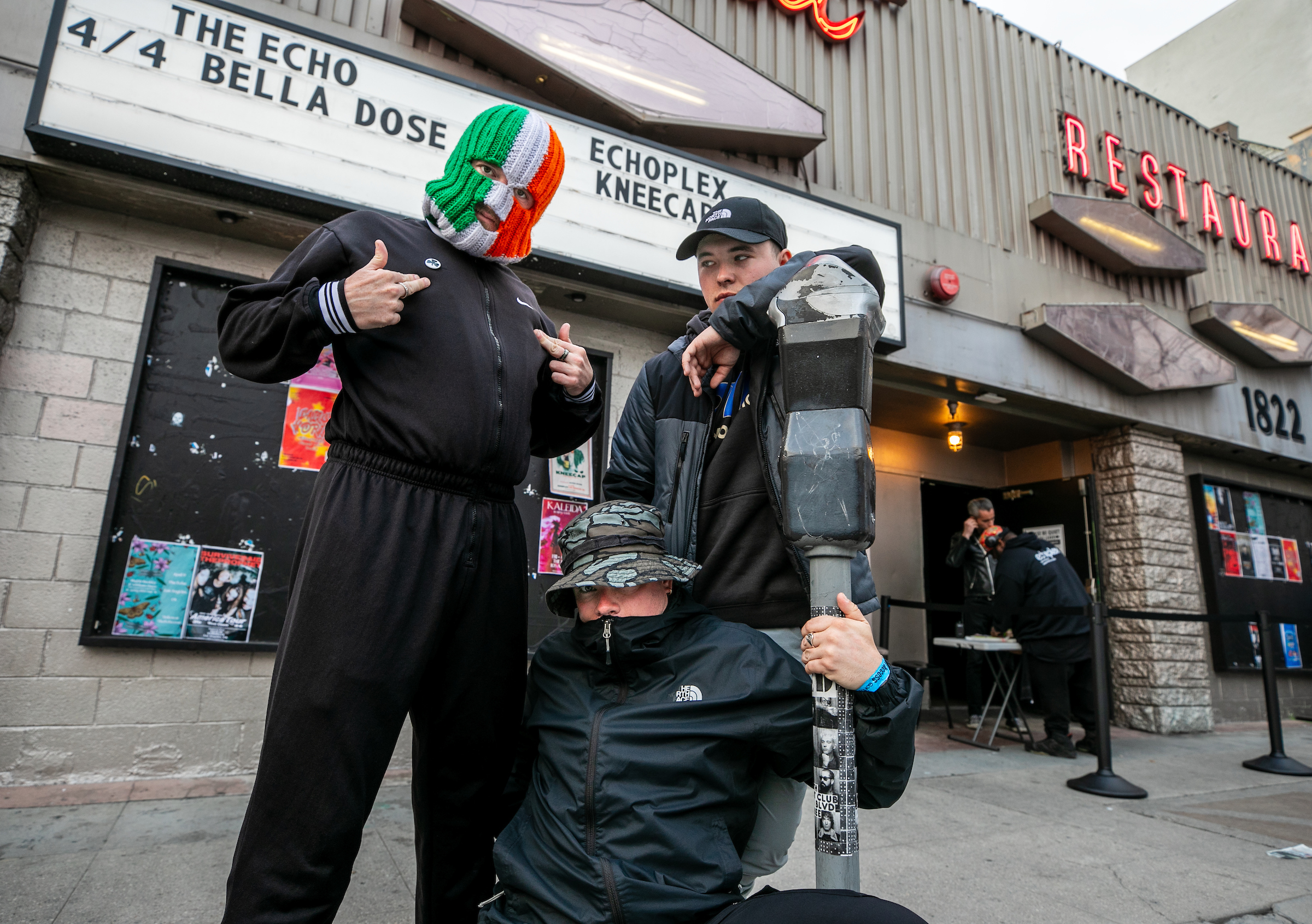The story of Kneecap begins at least 100 years ago. The rebellious, hard-partying hip-hop trio from Belfast didn’t exist in 1921, but that was the birth year of Northern Ireland and the partitioning off of six Irish counties as property of the United Kingdom. Then came generations of deadly conflict on the island and The Troubles between the Protestants and Catholics, the Loyalists and Irish Republicans, and on and on. Perhaps it goes back further, through many centuries of ultraviolence and despair following the earliest British invasions, still reverberating on the streets of Ulster even today. “We hold no resentment for the 800 years of colonization,” rapper Móglaí Bap says with sarcasm and a smile. His Kneecap partner Mo Chara concurs: “Nah, it’s only 800 years. We forgot about it.”
That history is just one source of inspiration for Kneecap, who defiantly embrace their culture as the leading ambassadors of Irish-language rap, winning over an intense following on both sides of the Atlantic. Their subject is not just culture and street politics, but good times in the pub and onstage, imbibing to the extreme. That rise has already led to a feature film, the self-titled Kneecap, which premiered in January at the Sundance Film Festival. There’s also their newly released debut album, Fine Art, recorded in London with producer Toddla T, deepening the sound established on 2018’s 3CAG EP with biting skits between songs that help transform the project into a concept album that’s both of-the-moment and tapped into Ireland’s larger history. “There’s a crossover between Irish folk music and folklore and hip-hop, because storytelling in Ireland is quite central to our identity,” notes Móglaí Bap.
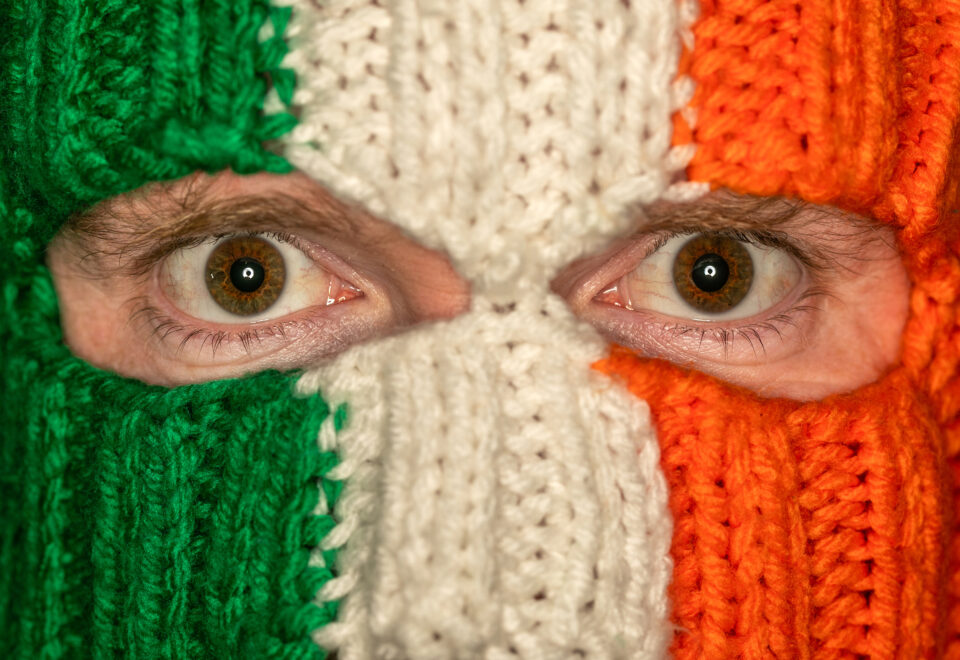
Kneecap’s DJ Próvaí backstage at the Echoplex nightclub in Los Angeles, where the hip hop trio from Belfast, Northern Ireland, performed songs that included Irish-language lyrics. The concert was ahead of the release of a new album, “Fine Art.”
Kneecap emerged from a squat in West Belfast, where these young dudes ran the bar and hosted legendary parties. As rappers, the two frontmen took on catchy stage names. Móglaí Bap (born Naoise O Caireallain) got his name from the bowl haircuts he got as a child, leaving him looking like the central character Mowgli from Disney’s animated The Jungle Book. Mo Chara (born Liam Og O hAnnaidh) took his from the Irish phrase for “my friend,” a greeting even many non-Irish-speakers in Belfast know. For DJ Próvaí (real name JJ O Dochartaigh), his alias and a Balaclava in the green-orange-white colors of the Irish flag began as a necessity. At the time, he was a music teacher at a Catholic secondary school. He was eventually discovered and abruptly exited his teaching job in 2020, says Mo Chara. “He was politely asked to fuck off at the school as quick as possible.”
Their career began in 2017 with the song “C.E.A.R.T.A” (its title taken from the Irish word for “rights”), set to a beat that balanced the spooky and festive, the Gaelic and streetwise. The lyrics are almost entirely in Irish, and it was recorded in Móglaí Bap’s bedroom, crafted over “a lot of joints, made on GarageBand, possibly the worst software for making music,” says Mo Chara. And yet, something recognizably their own came out of it. “We weren’t necessarily being like, ‘Let’s start a band.’ It was like, ‘Let’s do this for the craic [Irish slang for a good time, a laugh],’ you know? And then it went really well. Obviously, it only made sense to keep making more.”
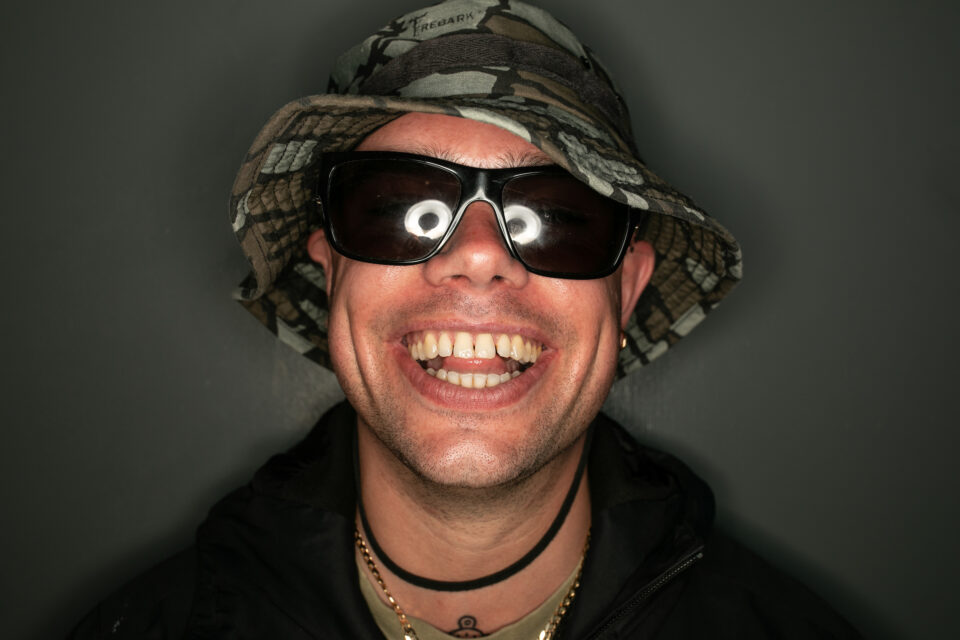
Kneecap rapper Móglaí Bap backstage at the Echoplex nightclub in Los Angeles, where the hip hop trio from Belfast, Northern…
“There’s a crossover between Irish folk music and folklore and hip-hop, because storytelling in Ireland is quite central to our identity.” — Móglaí Bap
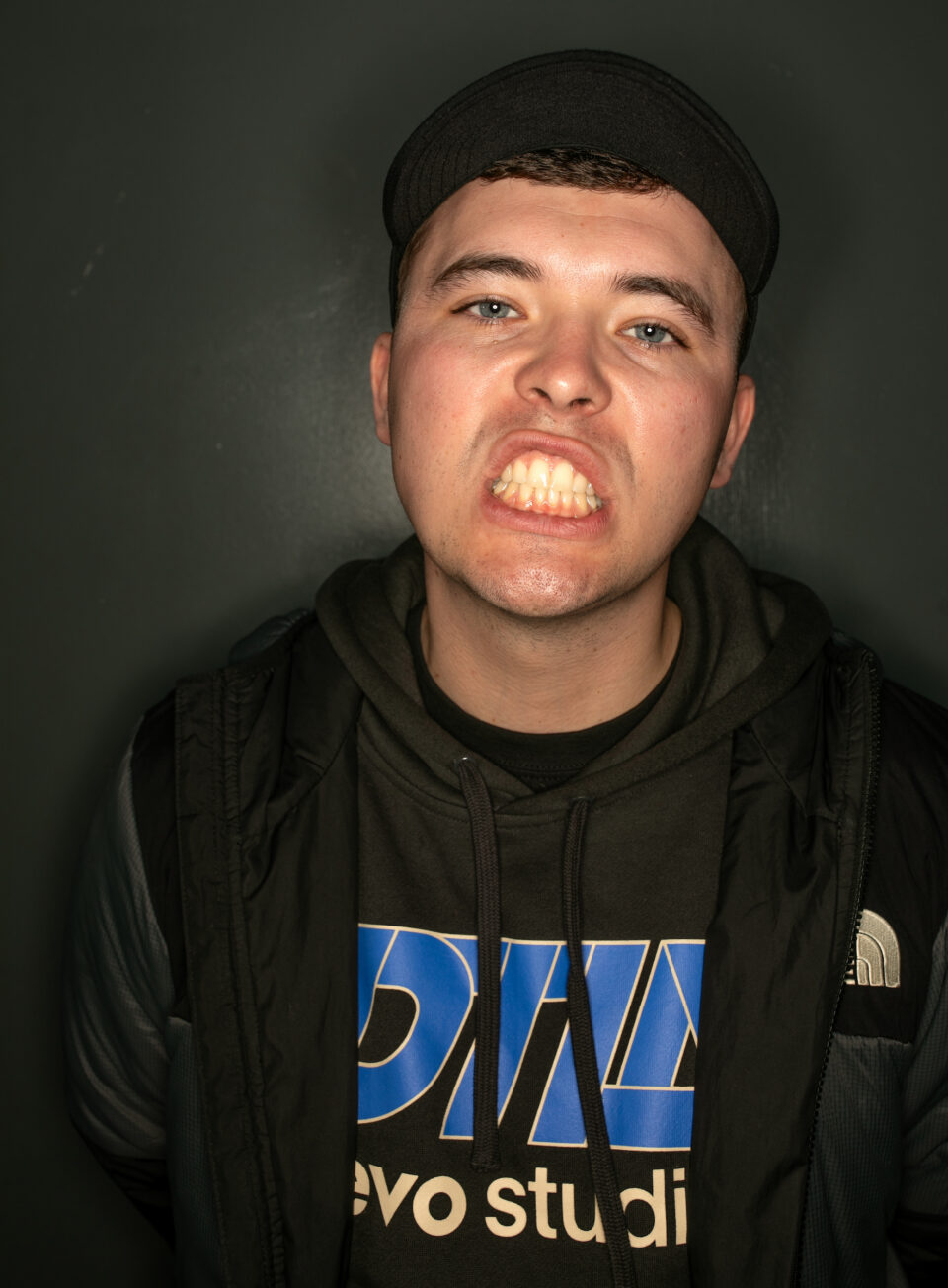
Kneecap rapper Mo Chara backstage at the Echoplex nightclub in Los Angeles, where the hip hop trio from Belfast, Northern…
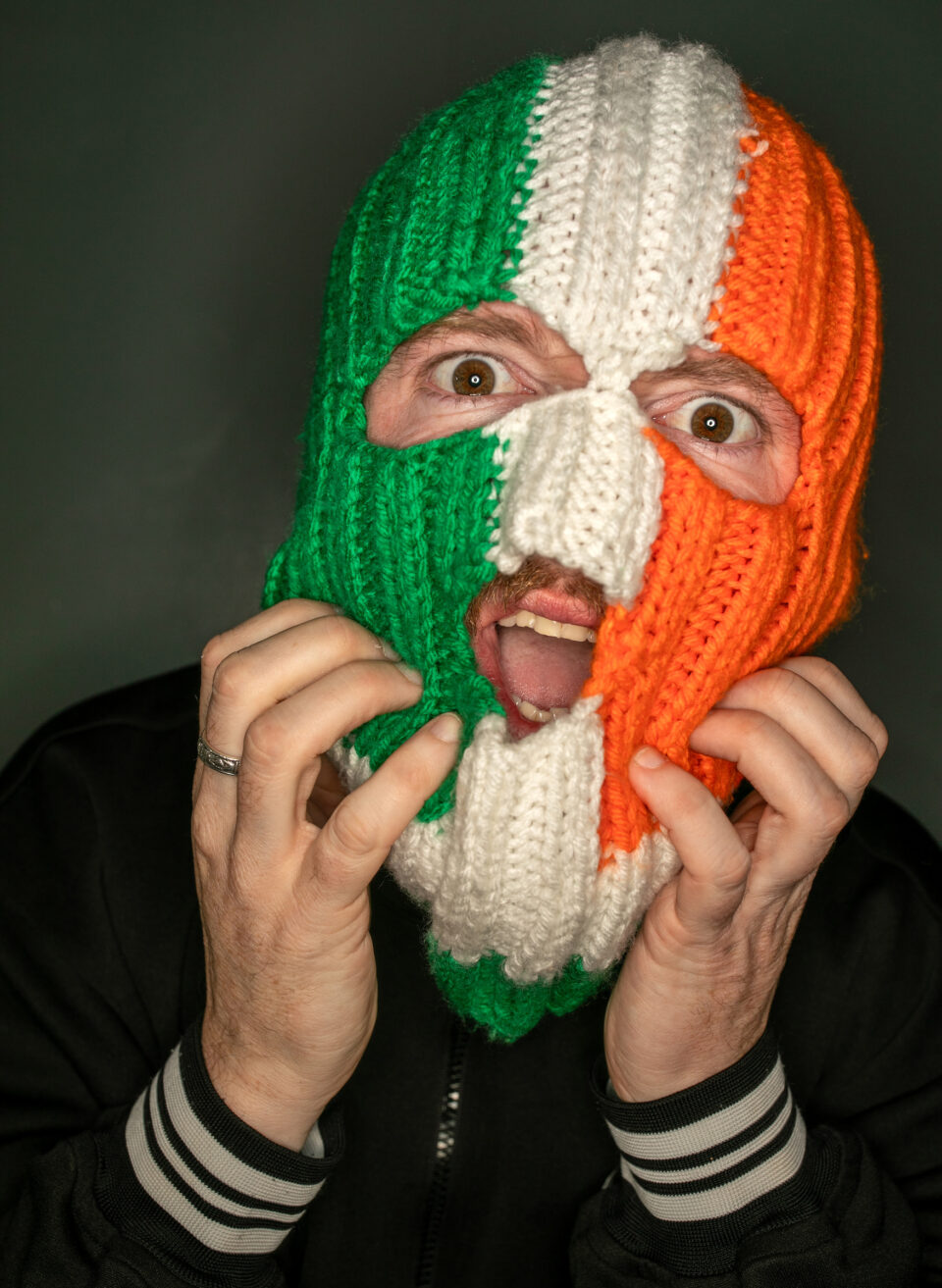
Kneecap’s DJ Próvaí backstage at the Echoplex nightclub in Los Angeles, where the hip hop trio from Belfast, Northern Ireland,…
With that first song completed, Kneecap tapped into the local filmmaking community that had risen alongside Game of Thrones, and where Ulster cinema craftsmen were happy to help the band spread the word by creating a pro-quality music video. The finished film begins with a defiant moment of agitprop on the streets, showing the two rappers putting on masks before spray-painting the word “CEARTA” onto a wall just as an undercover cop car rolls up and they make a run for it. It was a scene based on reality as Móglaí Bap lived it in 2017, as he protested for recognition of the Irish language. “We were having marches,” he says. “I was spray-painting the bus stop and then an undercover car in a black insignia pulled up across the road and did a big skid and four policemen jumped out. But policemen aren’t known to be very fast on their feet,” he adds with a laugh, “so they weren’t very able to catch me.”
Soon, Kneecap put the song and video up on Facebook and it quickly went viral, finding an audience of Irish youth ready to embrace a language often dismissed as “conservative or rural,” says Móglaí Bap. Kneecap transformed that into something urgent and urban, and created their own translations in Irish Gaelic of contemporary youth culture terms. “It connected with people pretty quickly, because there wasn’t anything like that,” adds Mo Chara. “This was a culture and something that was happening in society—young Irish speakers in the city partying with each other—and there was no representative in music that way. People were glad to see it, ’cause it represented them.”
“We weren’t necessarily being like, ‘Let’s start a band.’ It was like, ‘Let’s do this for the craic,’ you know? And then it went really well.” — Mo Chara
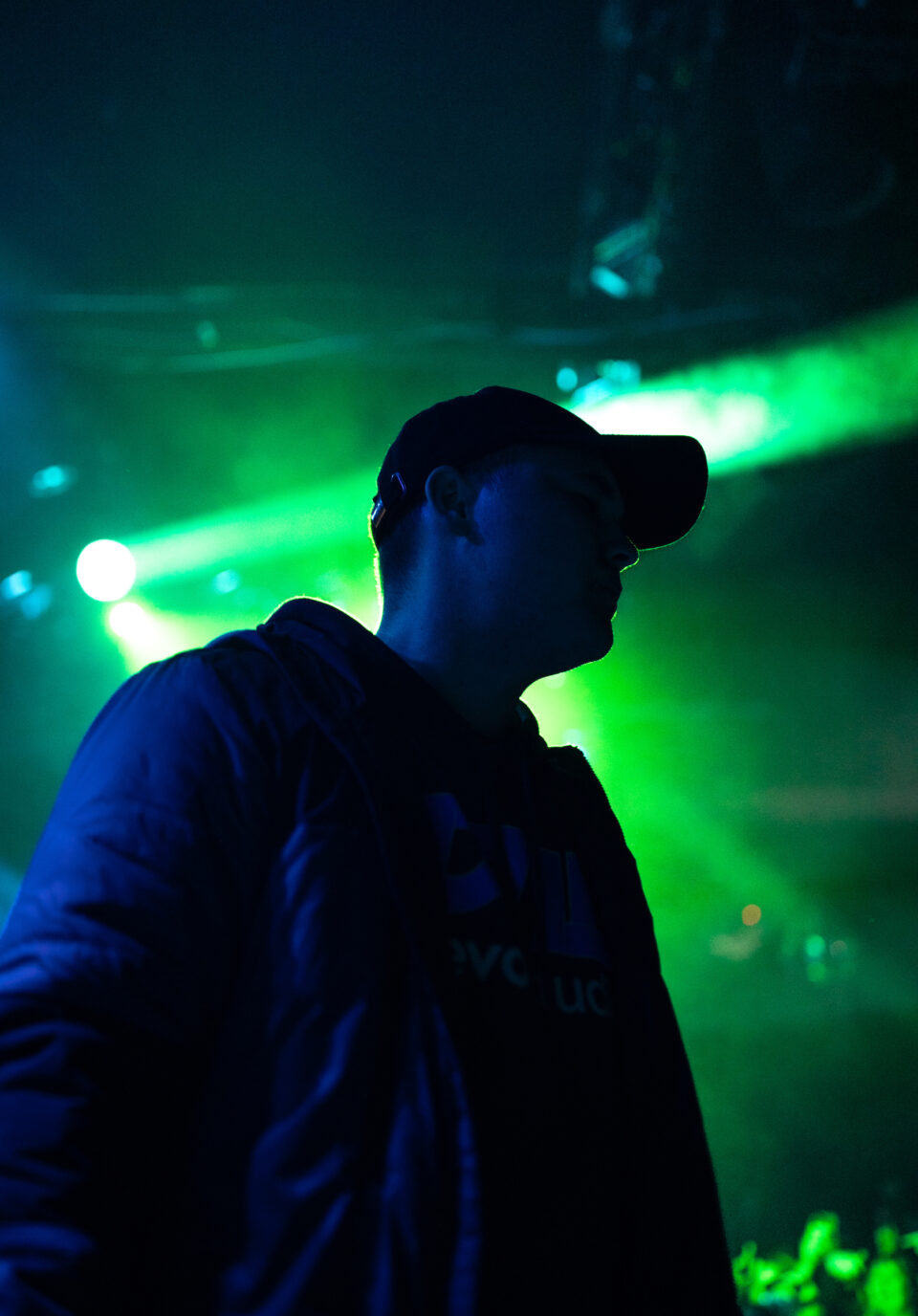
Kneecap performs at the Echoplex nightclub in Los Angeles. The hip hop trio from Belfast, Northern Ireland, performs songs that include Irish-language lyrics. Rapper Mo Chara performs to a full house ahead of the release of a new album, “Fine Art.”
“We pissed off a lot of conservative Irish speakers,” Móglaí Bap says, “’cause they had an idea that the language should be pure and we should be talking about turf fires and mountains and stuff—”
Mo Chara cuts in: “Rather than cocaine.”
As much to their surprise as anyone’s, the Irish language has been no barrier to reaching audiences around the world. Kneecap now sees the situation as little different from the rise of South Korean pop stars to Western audiences who don’t share a language. After all, BTS is a huge success in the UK. “You had them selling out Wembley two nights, and most of the people there didn’t speak Korean. It didn’t matter,” says Móglaí Bap.
On the road in America, Kneecap has often seen fans singing along to every Irish word of their songs. “We definitely didn’t think that it would go beyond Ireland,” says Móglaí Bap. Even he expected language to be a barrier for anyone beyond their own community. “People are now changing their opinion of the language. With colonization, for so long we were told that the language isn’t useful in the world of business and globalization and all these things that are important in Western society. But now that we’ve done it and it doesn’t make a difference, it’s great to be able to go to America, maintain our integrity and our language and our culture.”
The band stirred some controversy when they unveiled a mural at a Belfast street party that depicted a burning police van, lifting a cartoonish drawing from a kids coloring book but adding flames and the Kneecap name in a playfully bubbly font. Beneath the image were the words “Níl fáilte roimh an RUC,” translated as “The RUC are not welcome.” The mural was painted by their friend Adam Doyle, and there was predictable outrage in Northern Ireland and across the British Isles. “Murals are a big part of culture in Belfast,” says Mo Chara, addressing the image that now emblazons a popular merch item for the band. “It’s a way to artistically get your politics out there. At the end of the day, people don’t trust the police here. Like most places, there’s some people that shouldn’t have power. We knew it was gonna be controversial. But it was a painting—it wasn’t like we actually set a police car on fire, even though the media would like to believe it was as bad.”
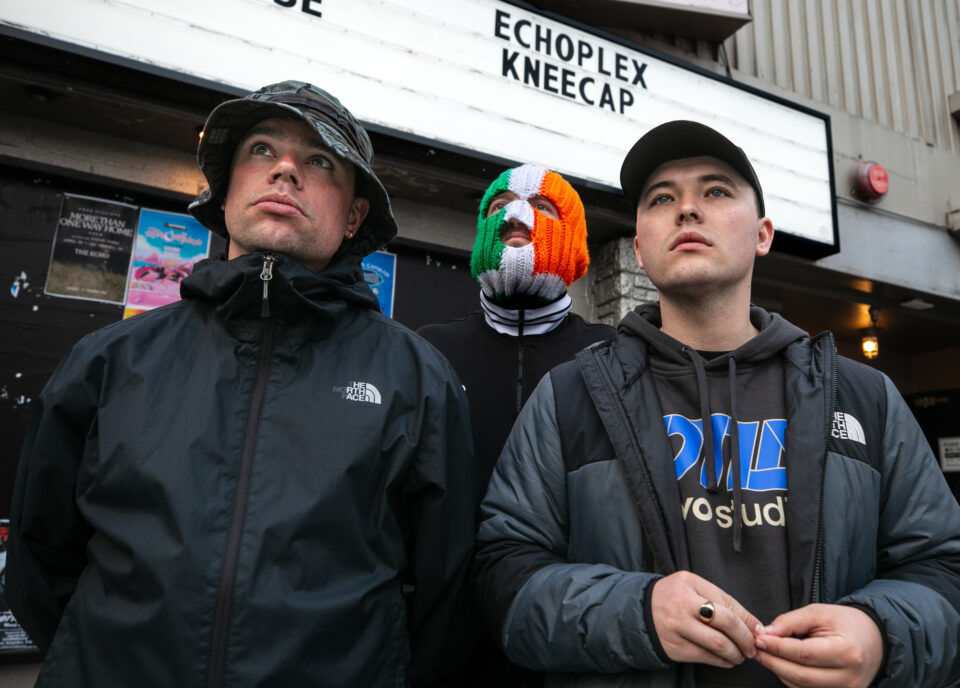
Kneecap in front of the Echoplex nightclub in Los Angeles, where the the hip hop trio from Belfast, Northern Ireland, were about to perform. The group performs songs that include Irish-language lyrics. (Left to right) Móglaí Bap, DJ Próvaí, and Mo Chara. The trio were abou to release a new album, “Fine Art.”
“We pissed off a lot of conservative Irish speakers, ’cause they had an idea that the language should be pure and we should be talking about turf fires and mountains and stuff.” — Móglaí Bap
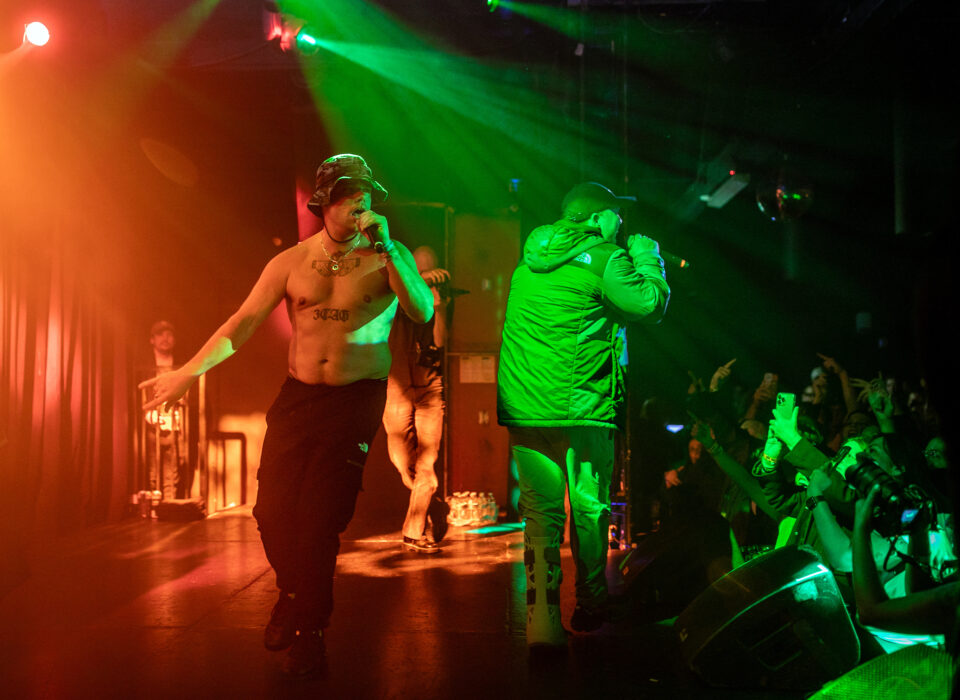
Kneecap performs at the Echoplex nightclub in Los Angeles. The hip hop trio from Belfast, Northern Ireland, performs songs that include Irish-language lyrics. Raper Móglaí Bap (left) and Mo Chara (right) perform to a full house ahead of the release of a new album, “Fine Art.”
The mural remains intact, right outside their favorite pub, and the rappers admit to being a little disappointed that no one’s defaced it with graffiti (“It’s there to be ruined,” says Mo Chara). But it’s become a magnet for tourism instead, notes Móglaí Bap: “It’s one of the stops in the tour they do in Belfast now. They stop at the mural and all the tourists get photos with it.” After the band described the mural as a piece of “fine art,” the controversy reached the BBC, where host Steven Nolan quoted those words on-air. Which is where Kneecap sampled his voice and included it in the title track on Fine Art. “He’s a prick,” Mo Chara says of the outraged broadcaster. “He’s just somebody who stokes fires and likes to rile both communities up. He’s not a real journalist.”
The nation’s history is touched on in a scene from Kneecap’s film with the rappers meeting with doctors to secure mood-altering prescriptions, as each takes turns spieling on their troubles. “You’ve heard of intergenerational trauma, right? Our history has become our biology,” Mo Chara says, speaking directly into the camera. “It’s like the trauma our ancestors suffered has inserted itself into our genetic code.” Then Móglaí Bap speaks and his words are intercut with vintage footage of IRA explosions on the streets, and he adds, “The Troubles? I’ve got fuckin’ troubles.” They approach that history with a mix of seriousness and black humor, like generations before. “It’s a very Irish thing to call it ‘The Troubles.’ ‘It was just a bit of trouble,’” Mo Chara adds now with a half-grin. “It was a 30-year war. ’The Inconvenience,’ it should’ve been called.”
Kneecap came about when the trio was approached by an indie film producer: Trevor Birney, a Brit living in Belfast. “We obviously ignored him, as you do,” says Mo Chara. But he kept coming around and soon made a plan, with a script by director Rich Peppiatt based largely on Kneecap’s lived experiences. The idea was to make the film true to their home in Northern Ireland, much like Danny Boyle’s druggy 1996 classic Trainspotting was authentically Scottish. And while most music films seem based around tragedies suffered by pop and rock stars, Mo Chara says, “I’m glad one of us didn’t have to die for a film to happen.”
To record Fine Art, Kneecap traveled to London to work with the DJ and producer Toddla T, who encouraged them to think beyond individual tracks and to instead consider the album as a whole. The anxious title track was created from scratch in about two hours, without any prepared lyrics or music—an eye-opening experience for Kneecap. They soon abandoned most of an album’s worth of material they’d prepared during the previous two years. “We got to London, got into the studio with T, and basically just started all over again,” says Móglaí Bap, “And 80 percent of it was done in, like, three weeks.” Among the most immediately catchy tracks is the single “Better Way to Live,” a song about finding meaning and good cheer amid the monotony of daily life. “It gave us a lot of freedom, because we come from a place that’s so serious,” Mo Chara says of the album. “It gave us an opportunity to be funny and enjoy ourselves a bit more, rather than having to do 12 aggressive, angry songs.”
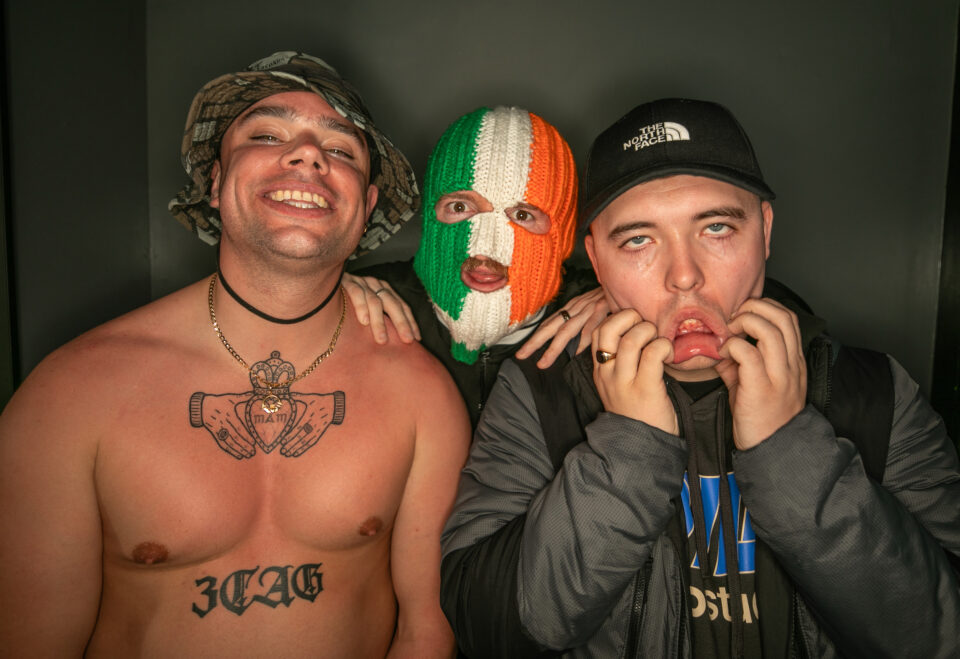
Kneecap backstage at the Echoplex nightclub in Los Angeles, where the the hip hop trio from Belfast, Northern Ireland, were about to perform. The group performs songs that include Irish-language lyrics. (Left to right) Móglaí Bap, DJ Próvaí, and Mo Chara. The trio were about to release a new album, “Fine Art.”
In the US, many of their fans are Irish-Americans, unsurprisingly, but many others of different kinds of heritage simply connect with the music—including two young Mexican-American women who turned out for six shows in a row during one tour. “They had no connection with Ireland, but I think the energy resonated with them,” says Móglaí Bap. “If you go to one of our gigs, there’s a good mix of genders there and it’s very wholesome, very fun, very high-energy. Everyone gets an opportunity to jump around and dance and get in the mosh pit and let loose.”
They’ve played shows with Boston-based Celtic-punks Dropkick Murphys and got on well, even with their wildly diverse messages. “We played with them once in London at the Alexandra Palace, but I don’t think the people were expecting us to get on and be screaming ‘Fuck the Queen,’” says Mo Chara. “We got a few boos at that, but I imagine that’ll go down a bit better in Boston, maybe.” Another Celtic act Kneecap has been within striking distance of is U2, the Dublin rock act that came of age before the rappers were born. “We were in the green room once when Bono was there,” says Móglaí Bap. “We were on a lot of ketamine, so I didn’t know if he was ‘far away’ or very ‘close.’”
“I mean, we’re in no rush to meet them anyway,” says Mo Chara.
“Nah, they’re not as popular in Ireland as they are in America, I think,” Móglaí adds with a laugh.
“They were at one point,” Mo Chara goes on, “until Bono done too many interviews and everyone realized he’s a twat.”
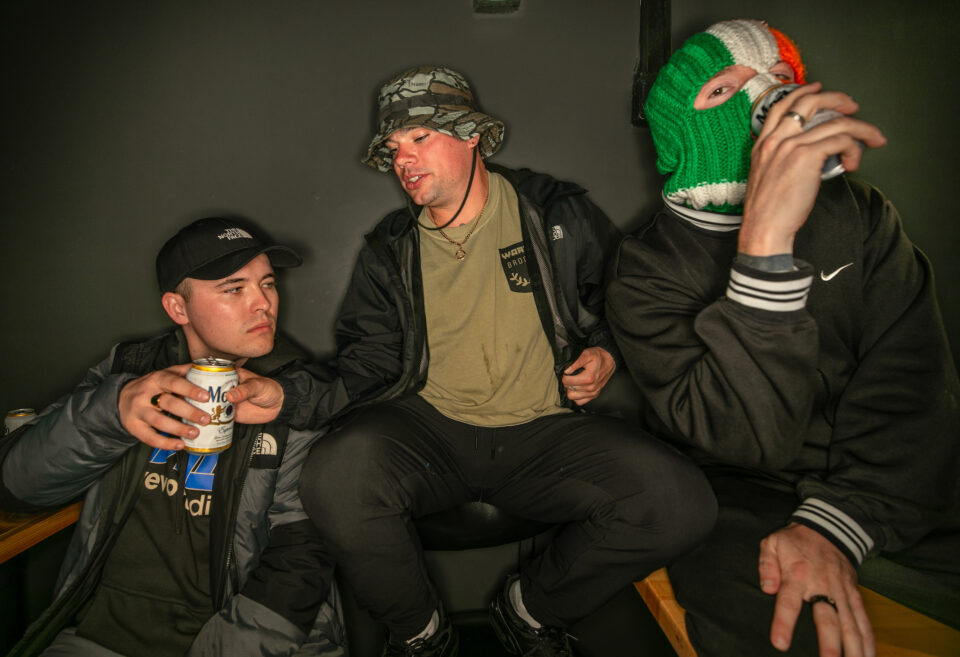
On their most recent stop in Los Angeles in April, Kneecap warmed up for the show by visiting a local firing range to shoot some AK-47 assault rifles. Hours later at the Echoplex, the trio decorated their dressing room with their shot-up targets—including one with the classic drawing of a swarthy ’50s-era thug pointing a gun. Ahead of their gig, Kneecap are unarmed and back to drinking. Back home, the drink of choice for a night of obliteration is Buckfast Tonic Wine, a concoction of alcohol and caffeine first invented in the 1880s by Benedictine monks. Bottles are difficult to find in the US, so the trio have turned largely to cans of Modelo, but they’re not always so particular in their choice of lager in America. “The fuckin’ Miller High Life—‘The Champagne of Beers’—that was great,” Mo Chara says with a smirk.
Onstage later, Móglaí Bap’s shirt comes off minutes into the gig, and all three are fueled by multiple cans of Topo Chico Hard Seltzer. Their partying before, during, and after shows comes naturally. “It’s the ritual now,” says Mo Chara. “Shane MacGowan nailed it. They asked him in an interview: ‘You’re always drunk on stage, do you feel it makes you better?’ And he’s like, ‘No, it makes us all way worse, but it’s just much more fun.’” FL

